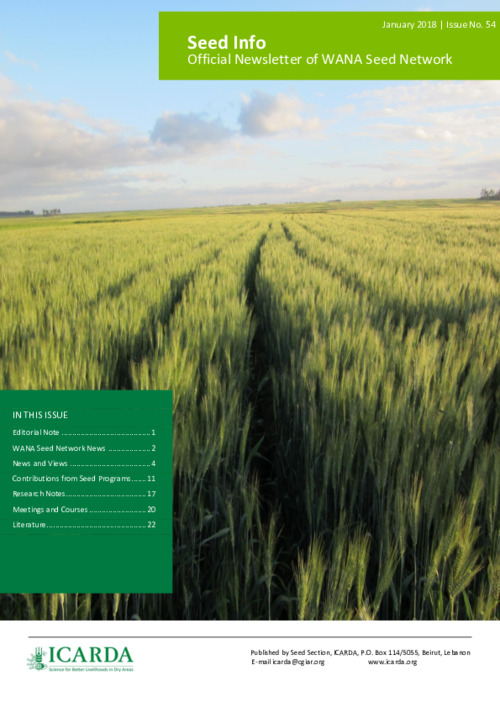Seed Info No. 54
Abstract
Seed Info aims to stimulate information exchange and regular communication among seed staff in the Central and West Asia and North Africa (CWANA) region and beyond. Its purpose is to help strengthen national seed programs and thus improve the supply of high-quality seed to farmers. 
 The WANA Seed Network News provides information on activities relating to global and/or regional cooperation and collaboration in order to facilitate the development of a vibrant regional seed industry. In this issue of Seed Info, we report on the regional seed workshops organized by Common Market for Eastern and Southern Africa (COMESA) and Food and Agricultural Organization (FAO) in Africa. 
In the News and Views section, Wynand J. van der Walt from FoodNCropBio, Pretoria, writes about the agricultural sector in South Africa. It gives highlights on the transformation of the agricultural sector from subsistence to a commercialized sector over the years. Government’s focus on domestic food production and quality seed provisions was the stimulus for seed industry growth and the beginning of commercial agriculture. Although agriculture is a major contributor to food security, it was taken over by mining and industry to the extent that the country became the most industrialized country in Africa, contributing 35% of Africa’s GDP and becoming Africa’s second biggest economy. The transformation of South African agriculture is a lesson for many countries, which can be adapted within national context. Other news in this section come from regional and/or international organizations, such as the International Seed Federation (ISF), the International Seed Testing Association (ISTA), and the International Union for the Protection of New Varieties of Plants (UPOV). 
The section on Seed Programs presents news from Ethiopia and Iran. In SeedInfo No 53, we have reported that Ethiopia is embracing the cooperative based seed production (CBSP) as an alternative strategy to fill the seed demand and supply gap in the country. Cognizant of this fact, the CBSP project, initiated by the Ethiopian Agricultural Transformation Agency (ATA) and partner organizations, has been bearing fruits. The initiative is structured within the current framework of the Cooperative Promotion Agency, where farmers become members of primary cooperatives at district level; and the primary cooperatives become members of the farmers’ cooperative union at the zonal/regional level. In 2016, the CBSP project worked with 147 primary seed producer cooperatives to establish 11 seed production and marketing unions, an umbrella organization at zonal level. These seed unions are operating in different geographies, commodities, and scales across four major crop-producing regions of the country. The ATA report highlights the on-going activities in strengthening the capacity and infrastructure as well as seed production and marketing experiences of the seed unions and their primary seed producer cooperatives. 
ICARDA is implementing a project Increasing the Productivity of Cereal-based System to Enhance Food Security in Iran. The project focuses on four provinces of East Azerbaijan, Kermanshah, Kurdistan, and Lorestan, targeting cold, moderate and hot agro-ecologies. Enhancing the availability and access of quality seed of wheat, barley and chickpea to increase productivity and production in rainfed areas is one of the major components of the project. Within this context, a National Workshop on Public-Private Partnership on Seed Delivery in Iran was held from 5-6 August 2017 in Tehran, Iran. The report from Iran provides a detailed report of the National Workshop on Public Private Partnership in Seed delivery in Iran. 
The Research section of Seed Info captures information on research activities or issues relevant to the development of seed programs in the CWANA region and beyond. This issue features an article by Aynewa et al. from ICARDA, Ethiopia, titled Farmers Preference of Food Barley Varieties in Southeastern Ethiopia. The paper discusses the participatory variety selection carried out at Africa Rising project sites in the Sinana district of Bale Zone in southeastern Ethiopia. Farmers identified high-yielding food barley varieties, which were well adapted, preferred by farmers, and were introduced into the local seed production. 
Seed Info encourages the exchange of information between national, regional, and global seed industries

